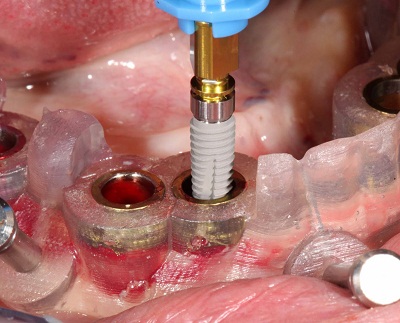Oral Surgery is the specialist area of Dental Medicine dedicated to the prevention, diagnosis and treatment of alterations, lesions and pathologies of the oral cavity and its adjoining structures.
The correction of alterations and pathologies of the oral cavity allows a significant improvement to be made to the aesthetic and functional capacity, to wit the phonetic, chewing and swallowing functions, in many cases with visible results in terms of the self-confidence and social involvement of the patients.
More complex clinical cases require that other specialist areas like Implantology, Orthodontics, Prosthodontics or Periodontology work in coordination with Oral Surgery prioritizing, in these situations, an integrated and multidisciplinary treatment plan.

A tooth may need to be taken out for various reasons, including the existence of extensive caries, severe bone loss brought about by infection or the need to gain space in the dental arch. Usually carried out under local anaesthesia, extractions may involve different degrees of complexity.
The non-eruption of a tooth may be brought about by various reasons, with one of the most common being the lack of space in the dental arch. If they are not removed, the constant pressure caused by the attempt to erupt may bring about various problems such as the destruction of neighbouring teeth, inflammation, pain and crowding. As they are the last to grow, the wisdom teeth are most frequently remaining unerupted. However, there are also situations in which the body produces extra teeth, the supernumerary teeth, which do not have space to erupt.
It requires the intervention of Oral Surgery. At the origin of some cysts there may be an unerupted tooth which has not been removed. There are cases in which the infection or cyst is located at the end of the tooth root (apex). In these situations, the endodontic treatment or re-treatment of the tooth is recommended. If the infection persists, the removal of the cyst will have to be carried out surgically.
Responsible for the production of saliva, the salivary glands are liable to suffer dysfunctions whose most frequent symptom is dry mouth (xerostomy). With consequences in terms of chewing, swallowing, nutrition, speech and breathing, its origin may be bacterial or viral infections, systemic disruptions (such as Sjögren’s syndrome, HIV, Lupus, Diabetes or Alzheimer’s), tumours or the interference of certain drugs. To determine the cause of the pathologies of the salivary glands, the means of diagnosis most frequently used are X-rays, CT - Scan and the evaluation of salivary flow.
